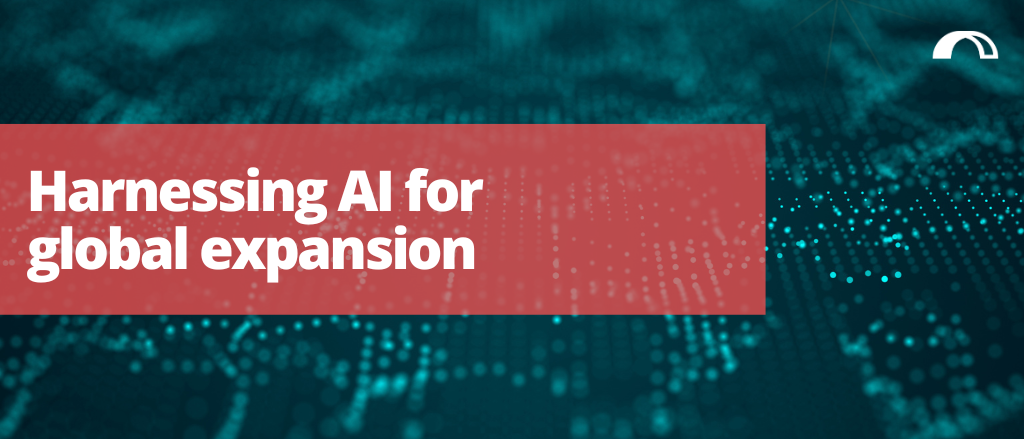For businesses seeking to broaden their horizons, applications of artificial intelligence (AI) can bring increased productivity, efficiency and rapid growth. With potential benefits like these, it’s easy to see how harnessing AI technology can help put you on the trajectory for global success. In this post, we’ll explore the areas where AI is aiding international expansion.
According to the Office for National Statistics, 16% of businesses across the UK are currently using at least one type of AI technology and a further 10% plan to adopt AI in the future. The IBM Global Artificial Intelligence adoption Index (2022) found that 35% of global companies polled were using AI in their business, with a further additional 42% reporting they were exploring the use of AI.
Where AI can make an impact
Artificial Intelligence can help drive:
- Market responsiveness
- Efficiency of cost and time
- Personalisation and standardisation
Add all this together, and you’ve got some potent tools for global expansion at your disposal. As consumers and business owners, we’re increasingly familiar with uses of Artificial Intelligence in commerce that we don’t necessarily recognise as such. Customer service chatbots, spam filters and recommendation algorithms are just a few everyday examples of applications of AI.
Ways AI can help your global expansion
1. Product development
AI can speed up product development for different markets. It can be used to process data to analyse feedback and market trends to help you pinpoint what to focus on and when. Using AI during different phases, such as research, development, and product testing, can also help you check product viability sooner, freeing your team up to concentrate on other launch elements or move on to the next iteration or innovation.
2. Turning up translation
Whether you’re sending a business email or looking at local language research about a particular market to roll out press content in a new sector, AI translation services could help you accelerate the process. While we’d always advocate having an expert human translator to check over the likes of contracts, marketing collateral and packaging for niggles and nuances, AI can help you to act quicker by providing accurate translations into your target languages, in individual communications or at scale.
3. Supply chain management
AI is already helping many companies to join the dots for more efficient supply chain management. AI tools can help global businesses keep a pulse on changes in consumer demand, better manage risk and manage market responsive production and distribution. Robotics in warehouses are improving inventory organisation as an alternative to human employees. They’re also improving productivity in areas such as packaging and inspection.
4. Manufacturing and quality control
Smart manufacturing can increase efficiency by monitoring the production process. It uses elements such as predictive engineering and data analysis for an agile production approach. For example, Volkswagen Group’s industrial cloud is deployed to, “detect potential faults in production line machinery in advance, helping avoid possible interruptions in production and increase efficiency.” Not only is there potential to find and fix faults earlier, preventing supply issues, but these systems can also help you build trust in new markets by stopping faulty products reaching consumers.
5. Resource and scale
Chatbots are one of the most widely adopted forms of AI. They can offer a low-cost first-line customer service solution when targeting new territories, but AI can also help you to source and scale staffing in other less obvious ways. Firstly, the use of automation and robotics from development to delivery can bring efficiencies that reduce human headcount. The IBM report reports that one in four companies are adopting AI because of labour and skills shortages. Secondly, software such as automatic candidate sifting tools and onboarding software can save time and ensure local employment legislation is adhered to.
6. Insights-driven marketing
Using Artificial Intelligence to process data, means you can super-charge marketing campaigns to target new audiences and drive higher ROI. As well as informing marketing strategy, AI can drive personalisation (often in real-time) when delivering advertising. There are also standardisation advantages for more global brands who need to maintain consistency worldwide. Earlier this year (2023), Nestle shared how they used AI to develop design rules for different online platforms to be used across territories. Along with ensuring work fits the brand, the rules mean design teams can create high-performing artwork within approved parameters more quickly.
What’s next for AI and global expansion?
With further innovations in the pipeline, we can be confident that AI will open up additional opportunities for ambitious businesses in the future. A Stanford University report (2023) found the number of AI patents increased 30-fold between 2015 and 2021.
If you’ve set your sights on scaling up or stepping into new economic territories, Artificial Intelligence could help you increase productivity and efficiency and give you the space to focus on growth.
It’s important to remember that while AI can help to increase productivity and growth, you need a solid go-to-market plan if you want to succeed in new markets. If you’re ready to explore what international expansion looks like for your business, we’re ready to roll our sleeves up and help put you on the path to growth. We’re a go-to-market agency with proven processes and methodologies that are guaranteed to bring in results in 90 days. Take the first step, get in touch.






